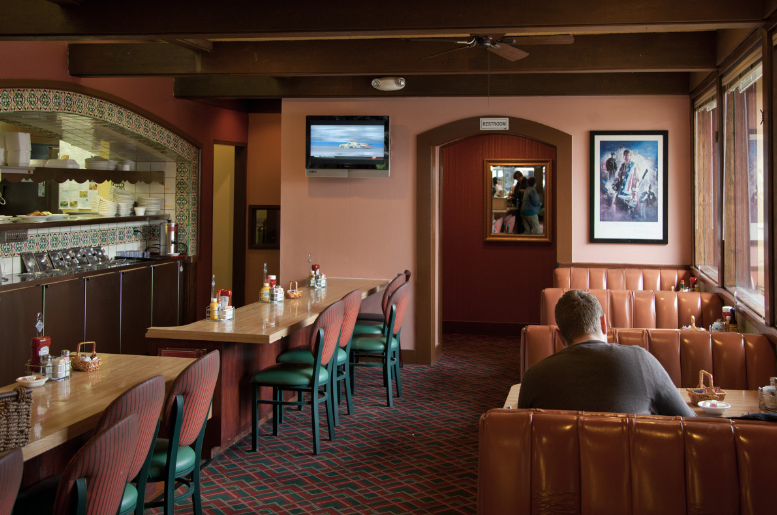A little breakfast joint. Birmingham, Alabama. The birth pangs of summer are in the air. Alabama feels like a Monet. Trees are pregnant with blossoms. Birds are everywhere.
On my way into the restaurant, I see a man seated on the sidewalk, weeping. A young woman sits beside him, rubbing his shoulders. I’m wondering what’s wrong. I’m probably staring, even. Which isn’t polite, but I can’t help it.
The first thing you should know about me is that I am very nosy person. I get this from my mother. I have my black belt in rubbernecking.
“I can’t believe he’s gone,” I overhear the man say. “I can’t believe it.” Then he blows his nose into a hanky. The young woman just cries with him.
Nosy, I tell you.
Inside the restaurant, the young waitress tells me to sit wherever I want. I sit in the corner so I can see the people in the place.
Because I am a longtime people watcher. Nosy people usually are. Put me in a crowded airport and I could die happy.
My waitress today is a young woman with a tattoo of an infant footprint on her forearm. “What does the tattoo mean?” I ask.
“It’s my daughter,” she says. “She died shortly after she was born. It was a neural tube defect. She wasn’t even two days old, she died in my arms.”
“What was your daughter’s name?” I ask.
“Rachel.”
“I’m sorry.”
She thanks me. Then she takes my order. I order three eggs, over medium. One order of bacon. Hash browns. And white toast, for sopping material. It’s vitally important to have sopping material at breakfast.
The waitress leaves, and I am left looking around the dining room, observing. It’s your typical morning café, with a typical cast of characters. Workmen. Corporate people. Travelers. You name it.
I see men clad in business clothes. One of them is Facetiming with a family member. His daughter maybe.
He is passing the smartphone around the table. The little-girlish voice on the phone is saying, “I can’t wait until you’re back home, Daddy.”
“Me, too, sweetheart,” says Daddy. The man is masculine and businesslike. But his tone gives him away. He is all heart.
“I love you, baby,” he says quietly into the phone.
All his pals snicker.
I see a young man in the corner of the restaurant. He is using a wheelchair. He is young. Maybe 13. An older woman is feeding him with a spoon. The young man is eating grits.
She blows on each spoonful to cool it before he takes a bite. And after every bite, he claps his hands with glee. I’ve never seen anyone love grits this much. Welcome to Birmingham.
“These are so good!” he is saying in a voice that’s loud enough to affect the migratory patterns of geese.
I see a table of Latinos. They are speaking rapid-fire Español. They are clad in neon work clothes. Men and women. Landscapers, maybe.
Their food arrives. They all hold hands and close their eyes. They say a blessing over the food, although I have no idea what they are saying.
“Amén,” they all say in unison. And oddly, they seem to actually mean it.
I glance out the window. The old man who was crying on the sidewalk is now leaning his head on the young woman who consoles him. She is rubbing his head. They are both crying hard. And I’m left wondering what tragedy has befallen them.
My food finally arrives. The eggs are cooked flawlessly. My sopping material is also toasted perfectly—not too dark, not too white. Toast is a funny thing. If, for example, your toast is toasted too long, you can’t sop your egg yolks because the bread is too hard. If the toast is too soft, however, it’s communist food.
The waitress asks if everything looks good on my plate. I tell her it looks perfect. Then I press my luck and ask if she has pictures of her late infant daughter.
“Yeah,” she says.
So she shows me her phone. In the photo, the infant has a shock of reddish hair. And she is so tiny it hurts. She is clean, pink, fleshy, and wrapped in swaddling clothes. It’s hard to imagine a baby like this dying. It’s hard to imagine a world cruel enough to claim a baby.
“She was beautiful,” I say.
The waitress shakes her head. “Not ‘was,’” she says, pointing to the ceiling. “‘Is.’”
Sometimes it pays to be nosy.
Sean Dietrich is a columnist and novelist known for his commentary on life in the American South. He has authored nine books and is the creator of the “Sean of the South” blog and podcast. The views and opinions expressed here are those of the author and do not necessarily reflect the policy or position of 1819 News. To comment, please send an email with your name and contact information to Commentary@1819News.com.
Don’t miss out! Subscribe to our newsletter and get our top stories every weekday morning.










